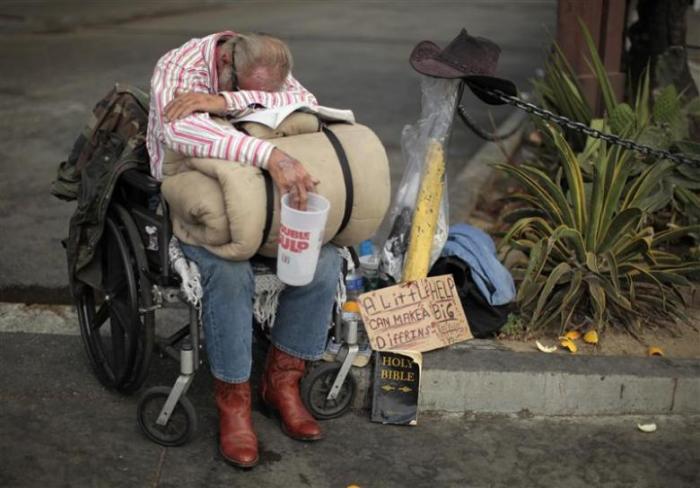Christians More Likely to Blame Poverty on Lack of Hard Work Than Bad Circumstances, Study Claims

A study by The Washington Post and the Kaiser Family Foundation claims that Christians in general, and white evangelical Christians in particular, are much more likely than non-Christians to attribute poverty to individual failings.
Forty-six percent of all Christians said that a lack of effort is generally to blame for a person's poverty, compared with 29 percent of all non-Christians, according to the poll, which was conducted from April 13 to May 1.
Among white evangelical Protestants, 53 percent blamed lack of effort while 41 percent blamed circumstances. Among Catholics, half blamed lack of effort while 45 percent blamed circumstances, the study says.
However, 65 percent of Americans who are atheist, agnostic or have no particular affiliation attributed poverty to difficult circumstances, 31 percent to lack of effort, the study adds.
Among black Christians, 32 percent blamed lack of effort, compared to 64 percent who blamed circumstances.
Among Democrats, 26 percent blamed a lack of effort and 72 percent blamed circumstances. Among Republicans, 63 percent blamed lack of effort and 32 percent blamed circumstances.
The study involved 1,686 American adults.
Dr. Richard Land, president of Southern Evangelical Seminary in Matthews, North Carolina, responded to the claims of the study.
"I would have skewed The Washington Post-Kaiser results because I am an evangelical Christian who happens to be both a premillennialist and a Republican and I don't fit any of the study's results," he said.
Land, executive editor of The Christian Post, added, "One has to be extremely naïve to believe that poverty is 'mostly' caused either by circumstance such as institutionalized racial, ethnic or class prejudice or lack of personal effort and responsibility, often aided and abetted by addictions to self-destructive substances."
He said individual poverty is due to "some complex combination of factors and varies with each individual."
"We all know of people born into privilege who end up as derelicts or worse," he reasoned. "And sadly, we all know of people with enormous talent and drive who, deprived of decent educational opportunities from their earliest years, and with no positive role models, or mentors, have been deeply hindered in breaking multi-generational cycles of systemic poverty into which they were born."
Christians must love each person as God loves them and "to help them realize God's purposes for their lives, which includes, among other things, a basic standard of self-sustaining economic stability," he continued. "In other words, as Christians we should not only give hungry people fish to eat, we should also teach them how to fish, and help them get a fair market price for the fruit of their labor."
The Washington Post quoted Albert Mohler, president of Southern Baptist Theological Seminary in Louisville, Kentucky, as saying that there's a strong Christian impulse to understand poverty as deeply rooted in morality. Unwillingness to work and bad financial decisions or broken family structures lead to poverty, he said.
"The Christian worldview is saying that all poverty is due to sin, though that doesn't necessarily mean the sin of the person in poverty," he explained. "In the Garden of Eden, there would have been no poverty. In a fallen world, there is poverty."
In June 2014, Arthur Brooks, president of the American Enterprise Institute, told The Christian Post that while liberals talk about poverty but have bad policies, conservatives avoid the issue.
"So you have one side that talks about it and doesn't get the job done, you have another side that's not talking about it, that's a conspiracy against poor people. That's the real problem we have in America today," Arthur said.





























